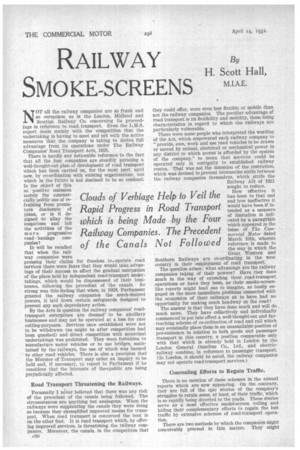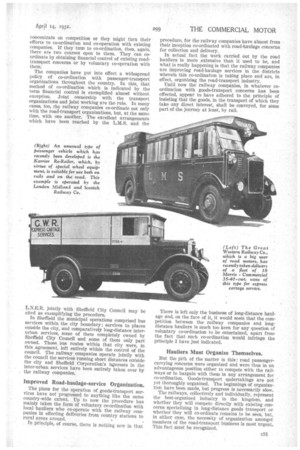RAILWAY SMOKE-SCREENS
Page 52

Page 53

If you've noticed an error in this article please click here to report it so we can fix it.
By
H. Scott Hall,
N• OT all the railway companies are so frank and so outspoken as is the London, Midland and Scottish Railway Co. concerning its proceedings in reference to road transport. Eventhe L.M.S. report deals mainly with the competition that the
undertaking is having to meet and not with the active measures that the company is taking to derive full advantage from its operations under The ' Railway Companies' Road Transport Acts, 1928.
There is hardly any noticeable reference to the fact that all the Jour companies are steadily pursuing a well-thought-out plan of development of road transport which has been carried on, for the most part, until now, by co-ordination with existing organizations, but which in the future is not destined to be so confined.
Is the object of this so positive omission merely the commer cially politic one of refraining from prema ture disclosure of
plans, or is it de;signed -to allay the
suspicions and lull the activities of the more progressive road haulage com panies? .
1t will be recalled that when the rail
way companies were pressing their claims for freedom toe-operate road services there were fears that they would take advan tage of their success to effect the gradual usurpation of the place held by independent roid-transport undertakings, which would be dispossessed of their busi nesses, following the precedent of the canals. So strong was this feeling that when, in 1928, Parliament granted the railway companies the much-desired powers, it laid down certain safeguards designed to prevent any such depredatory action.
By the Acts in question the railway companies' roadtransport enterprises are deemed' to be ancillary businesses and may not be operated at a loss for rate cutting-purposes. Services once established were not to be withdrawn (as might be after competition had been quashed) and direct competition with municipal undertakings was prohibited. They were forbidden to manufacture motor vehicles or to use bridges, maintained by the railways, the use of which was banned to other road vehicles. There is also a provision that the Minister of Transport may order an inquiry to be
held and, if necessary, to report to Parliament if he considers that the interests of the,9public are being prejudicially affected.
Road Transport Threatening the Railways.
Personally I never believed that there was any risk of the precedent of the canals being followed. The circumstances are anything but analogous. When the railways were supplanting the canals they were doing so because they exemplified improved means for transport. When road transport is concerned the boot is on the other foot. It is road transport which, by offering improved services, is threatening the railway companies. Moreover, the canals, in the competition that
e30 they could offer, were even less flexible or mobile than are the railway companies. The peculiar advantage of road transport is its flexibility and mobility, these being characteristics in regard to which the railways are particularly vulnerable.
There were some people who interpreted the wording of the Act, which empowered each railway company to "provide, own, work and use road vehicles to be drawn or moved by animal, electrical or mechanical power in any district to which access is afforded by the system of the company," to mean that services could be operated only in contiguity to established railway routes. That was not the intention of the restriction, which was devised to prevent internecine strife between the railway companies themselves, which .strife the Railway Act of 1921 sought to reduce.
How effective it has been to that end and how ineffective it would have been if intended as a measure of limitation is indicated by a paragraph which appeared in the issue of The Commercial Motor dated March 10th, wherein reference is made to the way in which the
Great Western and Southern Railways are co-ordinating in the west country in their employment of road transport, The question arises : what advantage are the railway companies taking of their powers? Have they done much in the way of extending theirroad-transport operations or have they been, as their smoke-screenlike reports might lead one to imagine, so busily engaged on the More immediate problems connected with the economics of their railways as to have had no Opportunity for making much headway on the road?
The answer is that they have done much and will do much more. They have collectively and individually commenced to put into effect a well-thought-out and farreaching scheme of co-ordination of road and rail which may eventually place them in an unassailable position of pre-eminence in relation to both goods and passenger transport in this country, a position comparable only with that which is already held in London by the London General Omnibus Co., Ltd., and electricrailway combine, in reference to passenger transport. (In London, it should be noted, the railway companies may not operate road-transport services.)
Concealing Efforts to Regain Traffic.
There is no mention of these schemes in the annual reports which are now appearing. On the contrary, they are full of the epic stories of the company's struggles to retain some, at least, of their traffic, which is so rapidly being diverted to the roads. These stories serve as a most effective smoke-screen veiling and hiding their complementary efforts to regain the lost traffic by extensive schemes of road-transport operation.
There are two methods by which the companies might conceivably proceed in this matter. They might concentrate on competition or they might turn their efforts to co-ordination and co-operation with existing companies. If they turn to co-ordination, then, again, there are two courses open to them. They can coordinate by obtaining financial control of existing roadtransport concerns or by voluntary co-operation with them: The companies have put into effect a widespread policy of co-ordination with passenger-transport organizations throughout the country. In this, that method of co-ordination which is indicated by the term financial control is exemplified almost without exception. Joint ownership with the transport organizations and joint working are the rule. In many cases, too, the railway companies co-ordinate not only with the road-transport organizations, but, at the same time, with one another. The excellent arrangements which have been reached by the L.M.S. and the L.N.E.R. jointly with Sheffield City Council may be cited as exemplifying the procedure.
In Sheffield the municipal operations comprised bus services within the city boundary ; services to places outside the city, and comparatively long-distance interurban services, some of them completely owned by Sheffield City Council and some of them only part owned. Those bus routes within that city were, in this agreement, left entirely within the control of the council. The railway companies operate jointly with the council the services running short distances outside the city and Sheffield Corporation's inferests in the inter-urban services have been entirely taken over by the railway companies.
Improved Road-haulage-service Organization.
The plans for the operation of goods-fransport services have not progressed to anything like the same country-wide extent. Up to now the procedure has mainly taken the form of voluntary co-ordination with local hauliers who co-operate with the railway companies in effecting deliveries from country stations to rural areas around. • In principle, of course, there is nothing new in that procedure, for the railway companies have almost from their inception co-ordinated with road-haulage concerns for collection and delivery.
In actuals fact the work carried out by the road hauliers is more .extensive than it used to be, and what is really happening is that the railway companies are improving road-haulage services in the districts wherein this co-ordination is taking place and are, in effect, organiziiag the road-transport industry.
Until now the railway companies, in whatever coordination with goods-transport concerns has been effected, appear to have adhered to the principle of insisting that the goods, in the transport of which they take any direct interest, shall be conveyed, for some part of the journey at least, by rail.
There is left only the business of long-distance haulage and, on the face of it, it would seem that the competition between the railway companies and longdistance hauliers is much too keen for any question of voluntary co-ordination to be entertained, apart from the fact that such co-ordination would infringe the principle I have just indicated.
Hauliers Must Organize Themselves.
But the pith of the matter is this: road passengercarrying concerns were organized and were thus in an advantageous position either to compete with the railways or to bargain with them in any arrangement for co-ordination. Goods-transport undertakings are not yet thoroughly organized. The beginnings of organization have been made, but progress is necessarily slow.
The railways, collectively and individually, represent the best-organized industry in the kingdom, and whether they will compete directly with existing concerns specializing in long-distance goods transport or whether they will co-ordinate remains to be seen, but, in either case, the necessity• of organization amongst members of the road-transport business is most urgent. This fact must be recognized.












































































































